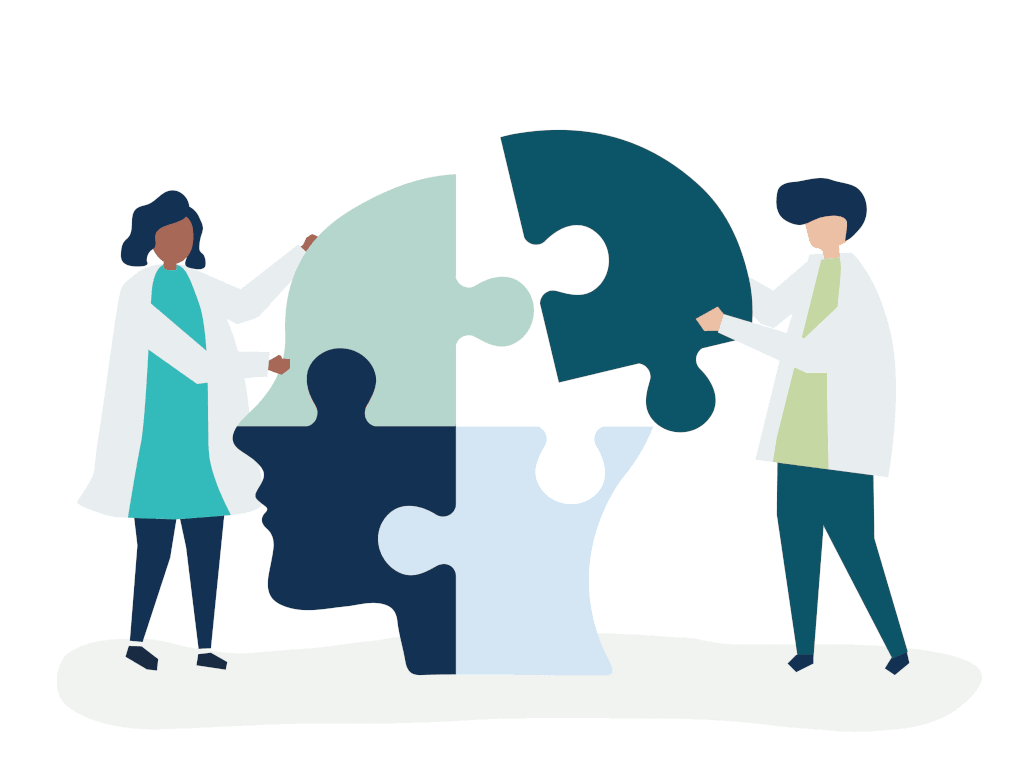What is Orthorexia?
Orthorexia nervosa describes an obsession with healthy eating and a fixation with eating certain foods that you find essential to a healthy diet. With orthorexia you will continuously focus on healthy eating to the point that takes over your life.
American physician Steve Bratman first created the term “orthorexia” in 1997. He noticed that several of his patients were constantly worried about their diet, to the point that it was negatively affecting their life.
Orthorexia causes an unhealthy obsession with dietary restrictions, and self-imposed dietary rules. Orthorexia nervosa is expected to result in medical complications like those linked to other eating disorders.
What are Some Symptoms of Orthorexia?
Below are common warning signs of orthorexia. You will need an official diagnosis from a healthcare professional.
Compulsive Adherence to an Eating Plan
You may have obsessive compulsive behaviors in relation to your dietary choices. You will have rigid eating patterns as well as a severely restricted diet.
Eating only Healthy Foods
With orthorexia nervosa, you will have a fixation on righteous eating and clean eating. A healthy lifestyle takes over everything. You may eliminate foods that you believe do not promote optimum health.
Feelings of Shame and Guilt
Your diet becomes directly related to your self-worth. If you eat processed foods, you may experience exaggerated emotional distress and shame or guilt. Breaking self-imposed dietary rules causes anxiety, fear of disease, sense of impurity, or negative physical sensations.
Negative Impact on Normal Functioning
Eventually, your restrictive eating starts to negatively impact your health, social and occupational functioning. Eating the right foods becomes increasingly important to you. You may have an obsessive focus on healthy eating and get distressed over food choices you feel are unhealthy.
Other warning signs you may have orthorexia:
- Malnutrition, severe weight loss, or other medical consequences from a restricted diet
- Intrapersonal distress or impairment of social, academic, or occupational functioning due to beliefs or behaviors about healthy living
- Self-worth, identity, and body image dependent on compliance with one’s “healthy” diet
Good Food Versus Bad Food?

Those who suffer from Orthorexia may categorize their foods into groups of either “good” or “bad.” The “good” foods are “pure” or clean. These foods meet a strict nutritional quality criterion.
The “bad” foods would be considered toxic and fall short of your nutritional requirements. You may experience a sense of accomplishment when eating “good” foods and a sense of guilt whenever a “bad” food is eaten. The shift between reward and punishment can cause anxiety and mood swings, as noted above.
How Common is Orthorexia?
It is hard to distinguish the difference between orthorexia and a typical preoccupation with eating a healthy diet. With this, it can be difficult to determine how common orthorexia is. Studies have shown ranges of between 6-90% of cases studied.
Orthorexia only turns into a problem and will be diagnosed if it is severely impacting your life.
What are the Health Effects of Orthorexia?
Physical
Orthorexia has not been heavily studied, but there may be similar health effects like with other eating disorders. Reducing calories to the point of malnutrition and limiting food intake can cause electrolyte and hormonal imbalances, indigestion problems, metabolic acidosis, and impaired bone health.
Social
With orthorexia you do not want to give up control of how you eat. With such rigid eating requirements, it may be difficult to participate in social gatherings; specifically, regarding gatherings where food is involved such as dinners or parties.
Believing that your food habits are superior to others will produce obsessive food related thoughts, making it more complicated to engage in social interactions.
Psychological
When you have orthorexia, and your food patterns are disrupted it can be extremely frustrating. Furthermore, when you break any rules regarding diet you may having feelings of shame, guilt, self-loathing, or compulsion.
You may spend a lot of your time researching, measuring, weighing, and cataloging all the food that you eat. This preoccupation could lead to a weaker working memory.
What are eating disorders?

Eating disorders include a range of mental health disorders that cause an unhealthy obsession with weight loss, healthy eating habits, or other medical complications. The most common eating disorders are anorexia nervosa, bulimia nervosa, and binge eating disorder.
Anorexia Nervosa
With anorexia nervosa you severely restrict your calories to lose weight. You view yourself as overweight when often you are seriously underweight. You may be obsessed with healthy eating habits.
Bulimia Nervosa
If you have bulimia nervosa you will eat substantial amounts of food in a brief period and purge to compensate for the extra calories.
Common purging compulsive behaviors include fasting, forced vomiting, laxatives, diuretics, enemas, and excessive exercise.
Binge Eating Disorder
Binge eating disorder is one of the most common among other eating disorders in the United States. Like bulimia, if you have binge eating disorder you will consume an excessive amount of food in a brief period. You will not purge or restrict calories in any way.
Is Orthorexia an eating disorder?
No, Orthorexia is not recognized by the Diagnostic and Statistical Manual of Mental Disorders, 5th Edition (DSM-5) as an official eating disorder.
Orthorexia is starting to be recognized by the medical community, however, neither the diagnostic and statistical manual of mental disorders DSM-5, the tool doctors use to diagnose mental health disorders, nor the American Psychiatric Association have officially said that the condition is an eating disorder.
Although, orthorexia is not considered an eating disorder, it often leads to anorexia nervosa. Anorexia has the highest mortality rate of all mental health disorders.
Are Entire Food Groups Cut Out with Orthorexia?
Yes, in many cases if you suffer from orthorexia nervosa you eliminate or cut out certain foods. These restrictions tend to lead to elimination of food groups and/or the addition of detox, cleanses, and fasts. The reason for this is that you have a strong fear of eating unhealthy food.
How is Orthorexia Related to Healthy Eating?

Orthorexia is an obsession with eating healthy. When enthusiasm for healthy eating turns into an obsession that negatively affects your life, you may have orthorexia. This may include refusing to eat out with friends or extreme weight loss.
Orthorexia typically begins as an “exuberant” interest in healthy eating that may escalate over time and becomes destructive or unhealthy.
Risk Factors for Orthorexia
- Developing a highly restrictive dietary theory
- Fear of disease
- Childhood illness involving diet and/or digestive issues
- Traits of obsessive-compulsive disorder (OCD), perfectionism, or extremism
- Medical problems that cannot be addressed by medical science
- Parents who place undue importance on healthy food, clean eating, and fad diets
A 2017 study of health, diet, and exercise looked at 275 U.S. college students and found that as many as 71% of participants engaged in behaviors that may be symptomatic of orthorexia. Other risk factors include high anxiety, tendencies toward perfectionism, or a need for control
How is Orthorexia Diagnosed?
Orthorexia can be diagnosed based on both the level of emotional stress as well as how much it prevents normal functioning.
Emotional Distress
- Self-imposed anxiety: Breaking self-imposed dietary rules causes fear of disease, negative physical sensations, anxiety, shame, or sense of impurity.
- Behaviors or thoughts: Mental preoccupations or compulsive behaviors with dietary choices are believed to promote optimal health.
- Severe restrictions: Dietary restrictions that worsen over time and can include eliminating entire food groups in addition of fasts, cleanses, or both.
Prevents Normal Functioning
- Medical issues: Medical problems such as severe weight loss or malnutrition can result from this type of compulsive behavior.
- Lifestyle disruption: Due to beliefs around healthy eating, it may be difficult to engage in social or academic activities. This results in disruptions in your lifestyle.
- Emotional dependence: Self-worth, identify, and body image, satisfaction or self-worth may be dependent on complying with self-imposed dietary rules.
Treatment for Orthorexia
Not getting treatment for orthorexia can cause unwanted consequences. If left untreated, it can cause damage to your health. Like other eating disorders, it is important to seek medical help.
Treatment for orthorexia has not been scientifically confirmed. Like other eating disorders, common treatments that may help include:
- cognitive restructuring
- exposure and response prevention
- nutritional therapy
- various forms of relaxation training
- behavior modification
Orthorexia Treatment at Turning Point of Tampa
If you have orthorexia, it will require professional treatment. An eating disorder specialist can treat you for the eating disorder and other co-occurring mental health concerns.
Although, there is not proven orthorexia treatment, there are ways to address the unhealthy relationship you have with food. Treatments that challenge the dietary theory and build more flexible eating have been successful in orthorexia treatment.
Counseling and cognitive behavioral therapy can be effective in treating orthorexia nervosa. Often, an eating disorder stems from mental illnesses that manifest with an obsession with body image and eating habits.
People with eating disorders are trying to find a way to have more control over their life, and this leads to a feeding disorder or other eating disorder.
The primary focus of treating eating disorders in our program is to offer nutritious, low sugar, high fiber, caffeine-free foods that also identify and eliminate each client’s individual food triggers and encourages eating.

